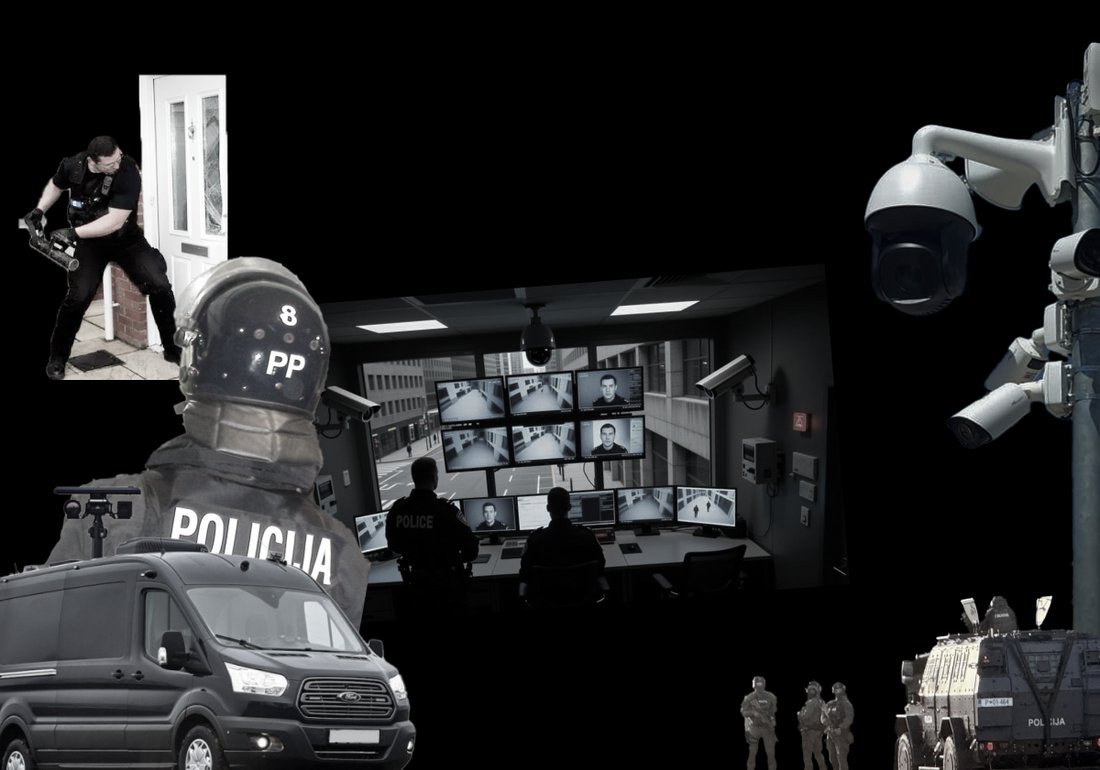Human Rights and the Rule of Law under Pressure
The Slovenian government introduced the draft bill as an urgent response to an allegedly perceived increase in public security threats and violent incidents related to the Roma community in Slovenia. The draft bill drastically expands executive and police powers, weakens judicial supervision, restricts the rights of defence, and facilitates mass surveillance under vague and open-ended criteria. Its adoption under urgent procedure bypasses democratic safeguards and undermines the rule of law.

Introduction
On 6th November 2025, the Slovenian government approved the draft bill titled the Act on Urgent Measures to Ensure Public Security (“Šutar’s Act”). The Slovenian government introduced the “Šutar’s Act” as an urgent response to an allegedly perceived increase in public security threats and violent incidents related to the Roma community in Slovenia. Officials publicly presented the draft bill as a temporary measure to strengthen police capacities and accelerate criminal proceedings. However, the proposed Act was drafted in a very short time, without consultation with experts, civil society, or the wider public. Because it is being adopted through an emergency legislative procedure, it largely bypasses democratic debate and legislative scrutiny. The draft bill introduces broad and intrusive provisions that seriously undermine constitutional guarantees, human rights standards and the rule of law. The key problematic measures include:
- Expanded Police Powers Without Judicial Oversight
The draft bill authorizes police to enter private dwellings without a court warrant in significantly broader circumstances than currently allowed. The threshold shifts from “immediate and concrete danger” to a vague and abstract assumption that there is a possibility that weapons have been hidden at a location. The definition of “weapons” in Slovene legislation is broadly defined (including items such as pepper spray or batons), allowing the possibility of disproportionate intrusion into private homes. This undermines one of the most fundamental constitutional guarantees – the inviolability of the home – and removes essential judicial safeguards against arbitrary state action.
- Mass Preventive Surveillance and Data Collection
The draft bill allows the long-term use of technical surveillance measures (video, audio, photography) in broadly defined “security-risk areas,” potentially anywhere in the country. “Security-risk area” is defined very broadly, encompassing any place where offences may occur in the future or where there is “high probability” of danger. Surveillance can last up to three months, renewable for another three, enabling continuous mass monitoring of the population without sufficient safeguards, transparency, or judicial control. A similar issue arises with automated license-plate recognition, which was already found constitutionally questionable by the Slovenian Constitutional Court. The draft bill reintroduces these measures without addressing legal deficiencies or data-protection risks.
- Serious Changes to Criminal Law and Procedure via “Urgent” Legislation
The draft bill amends core provisions of the Criminal Procedure Act (ZKP) and temporarily overrides the Criminal Code (KZ-1), even though it claims not to alter the systemic framework of criminal law. It introduces an exception to the absolute exclusionary rule, allowing courts to use illegally obtained evidence in serious crimes. This is a dangerous erosion of the right to privacy and fair trial, lacking clear safeguards or proportionality assessment. The draft bill also introduces changes regarding the regulation of pre-trial detention, which weaken judicial oversight and increase risk of abusive or discriminatory detention:
- Review of detention conditions would occur only every six months instead of every two.
- Maximum duration of detention may be extended from two years to three.
- Temporary “Parallel Criminal Law” and Disproportionate Sanctions
The draft bill introduces temporary criminal sanctions outside the Criminal Code, effectively creating a parallel penal system for two years. It raises sentences for certain offences, converts some minor criminal offences into administrative offences, and imposes excessively high fines (up to €3,000 for damage or theft under €500). High fines seem to be designed to push individuals into substitute imprisonment for unpaid penalties, which is contrary to the legitimate aim of the draft bill and lacks proportionality. This approach violates principles of legal certainty, foreseeability, and equality before the law, since identical conduct would be punished differently depending on timing, seemingly without a reasonable cause.
- Restrictions on Access to Free Legal Aid
Individuals who previously received legal aid in three or more minor-offence cases within the last three years may be denied further aid—regardless of case outcome or whether they were wrongly prosecuted. These restrictions risk creating systemic inequality and undermining the right to a fair trial and effective remedy.
Conclusion
This draft bill drastically expands executive and police powers, weakens judicial supervision, restricts the rights of defence, and facilitates mass surveillance under vague and open-ended criteria. Its adoption under urgent procedure bypasses democratic safeguards and undermines the rule of law. Considering all the above, there is a significant risk that the draft bill is incompatible with fundamental rights protected under the EU Charter of Fundamental Rights, the European Convention on Human Rights, and established principles of legal certainty, necessity and proportionality.
________________________________________________________________________________________________

Aktivnosti sofinancira Ministrstvo za javno upravo v okviru javnega razpisa za razvoj in profesionalizacijo NVO in prostovoljstva 2024.
Izražena mnenja ne predstavljajo uradnega stališča MJU.